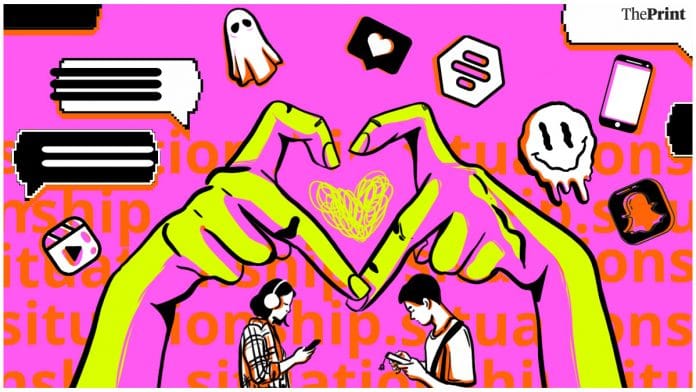Thank you dear subscribers, we are overwhelmed with your response.
Your Turn is a unique section from ThePrint featuring points of view from its subscribers. If you are a subscriber, have a point of view, please send it to us. If not, do subscribe here: https://theprint.in/subscribe/
They say time heals all wounds, but no one talks about certain invisible wounds which might take months or even years to heal. One such Gen Z phenomenon which has emerged in the past few years with the rise of social media and dating apps is “Situationships”, which has often been defined as an unofficial dating situation where two consenting individuals act like a couple but are not officially dating and is a relationship with no labels or commitment.
Often during such a situation one party may develop feelings for the other one but they don’t know where they officially stand and eventually one might end up getting hurt. But the question arises is, is it easy to get over someone with whom you were never officially in a relationship and can situationship breakups be devastating and traumatising as “real” breakups.
While in a relationship where two individuals are committed to each other and are officially dating there is a proper communication and exclusivity between the two parties whereas in a situationship which is an undefined setup where there are no clear boundaries and with a lack of consistency and commitment, it can lead to serious and multiple conflicts, with one party being emotionally unavailable to the other person’s emotional needs and expectations.
“The pain of a breakup isn’t about whether it was a “situationship” or a “relationship.” It’s about the depth of your emotions, the connection you felt, and how much that person mattered to you.It’s not just a ‘situationship breakup’ or a ‘relationship breakup’; it’s about the person you parted ways with and how much they meant to you. What were you hoping for? While a situationship is often described as ‘hookups with emotional benefits,’ we know that emotional intimacy is also integral to traditional relationships. So yeah, that’s where the line blurs.” says Kritika Bhaskar, a Delhi based writer.
Labels like “situationship” can be just attempts to structure our complex feelings for someone we didn’t have a traditional relationship with, whether by choice or because the other person didn’t want to commit. But in the end, it’s just heartbreak—painful and difficult beyond words—because that person is no longer around. Situationships are often cruel, addictive, thrilling, and brutal. The journey can be confusing, and the attachment can intensify the pain of a breakup. Throughout the entire timeline, an individual is hurting themself by choosing someone who is comfortable not respecting or caring about you. The individual is not getting what they truly want most of the time, and it is hurtful.
“Situationships, by their very nature, are ambiguous in their formation, making people question “what are we?”. While it may be considered less important than mutually discussed exclusive relationships, a loss of a current or prospective significant other is still experienced once a breakup occurs. As individuals in a situationship are emotionally and physically invested to some extent, emotional effects similar to relationship breakups are inevitable to an extent like sadness, anger, despair, feelings of hopelessness. Even if you were with another person without a label or exclusivity, you have put your time, effort, energy, and emotions into the situation. This is especially for the partner being broken up with, as there may be a misalignment of the expectations from the situationship. Many times people are in such a situation, with the hope that it might turn into an exclusive committed relationship.
Therefore, the loss is experienced similarly. The grief after a situationship breakup is also often negated and considered unimportant – people are expected to move on rather quickly. This further adds to the emotional turmoil experienced by the individual as their grief and sadness aren’t considered real. Additionally, the ambiguous nature of situationships can themselves be a source of reduced mental well-being, according to research.” says Delhi-based psychotherapist Sanjana Sarin.
Ironically, a situationship can also be hopeful in several ways. The person might believe it leads to something more, and even the smallest gesture can fuel that hope. But the reality is, you don’t just feel hurt at the end; you start feeling pain even while you’re in it. The worst part is that you’re putting yourself through a lot without realising it. As the person grows older, the fear of investing in a relationship grows too—fear of more pain, more heartbreaks. The effort seems exhausting, and social media’s expectations only make it worse.
“In a situationship, you often start off as friends, which may not always be the case in a relationship. And this is why it becomes a situationship because you’re too scared to lose what you’ve as a friend. This is why situationship has the risk of losing out on friendship. Furthermore situationships are more exhausting because you’re always walking on eggshells not knowing what’s expected of you. Are you supposed to behave like a partner or a friend? Are you supposed to act differently in public or not?” says Journalist Ishita Roy.
Situationships can seem convenient and appealing, removing the expectations of a traditional relationship. Sometimes, you settle for a situationship, knowing you want more, or you stay in it just to keep that person around. By doing this, you end up hurting yourself more than the other person. When the breakup happens, it’s brutal because you wanted more, but you convinced yourself you didn’t but deep down, the person with whom you were involved was either afraid of commitment or kept you as an option.
These pieces are being published as they have been received – they have not been edited/fact-checked by ThePrint


